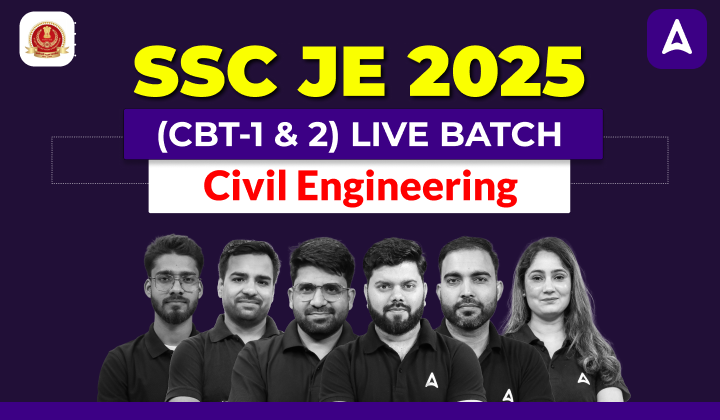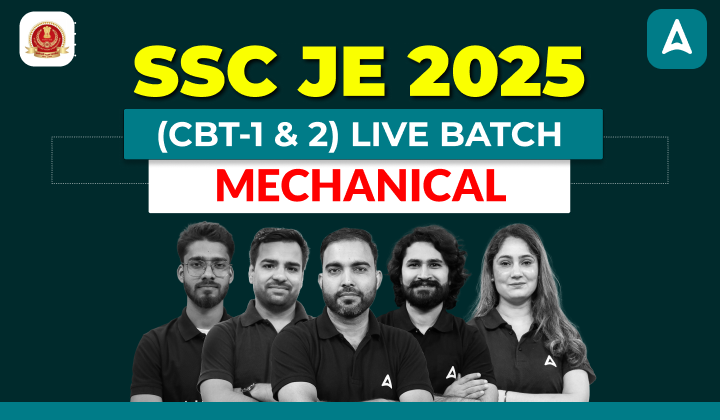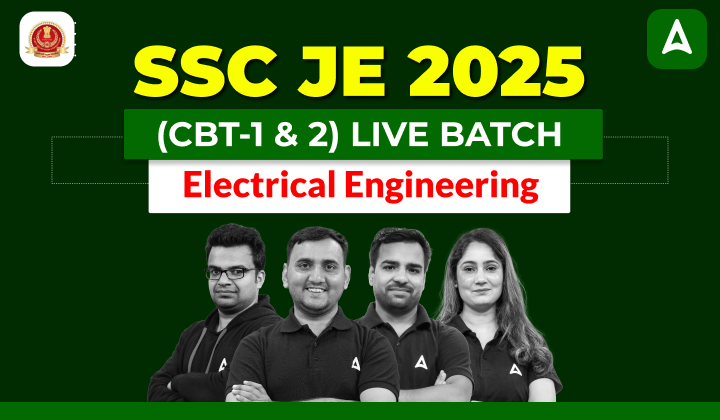Table of Contents
The Staff Selection Commission has released a detailed notification on its official website for the SSC JE Exam 2025. They’re looking to hire people who want to become Junior Engineers in different government departments or ministries. This exam is a great chance for those who want a good government job. If you’re interested in taking the SSC JE Exam in 2025, it’s important to begin preparing. One of the first steps is understanding the syllabus for the Civil Engineering section of the exam. This article gives a detailed overview of the SSC JE Civil Syllabus 2025 to assist aspirants in their preparation.
SSC JE Civil Syllabus 2025 – Overview
The section below covers a detailed overview of the SSC JE Exam 2025 for the convenience of aspirants:
| SSC JE Civil Syllabus 2025 | |
| Conducting Authority | Staff Selection Commission (SSC) |
| Exam Name | SSC Junior Engineer (SSC JE) |
| Frequency Of Exam | Once A Year |
| Level Of Exam | National Level Exam |
| Application Mode | Online |
| SSC JE Civil Syllabus | Available Now |
| Selection Process | Computer-Based Test ( Both Paper 1 and Paper 2) |
| SSC JE Official Website | www.ssc.gov.in |
SSC Junior Engineer Civil Syllabus 2025
Every year, a huge number of aspirants appear for the SSC JE Exam from the Civil Engineering discipline. To make the preparation effective, candidates must refer to the brief SSC JE Civil Syllabus to enhance their score to get their dream job. This article includes the SSC JE Syllabus for Civil Paper 2. You can check the Syllabus for Civil Engineering in this section:
Download SSC JE Previous Year Question Papers
Civil Syllabus for SSC JE Tier I
For the SSC JE Tier I Exam 2025, the question paper will consist of the following subjects, given below:
- General Intelligence & Reasoning
- General Awareness
- General Engineering:
Part A: (Civil Engineering & Structural Engineering)
Part B: (Electrical Engineering)
Part C: (Mechanical Engineering)
Life of a Junior Engineer After Clearing SSC JE
General Intelligence and Reasoning Topics
- Classification
- Analogy
- Coding-Decoding
- Paper Folding Method
- Matrix
- Word Formation
- Venn Diagram
- Direction and Distance
- Blood Relations
- Series
- Verbal reasoning
- Non-Verbal Reasoning
- Seating Arrangement
- Analogies,
- Similarities,
- Differences,
- Space visualization,
- Problem-solving,
- Analysis,
- Judgement,
- Decision making,
- Visual memory,
- Discrimination,
- Observation,
- Relationship concepts,
- Arithmetical reasoning,
- Verbal and figure classification,
- Arithmetical number series
- Arithmetical computations
General Awareness Topics
- Static General Knowledge
- Science
- Current Affairs
- Sports
- Books and Authors
- Important Schemes
- Portfolios
- People in the News
- History
- Culture
- Geography
- Economic
- General Polity and
- Scientific Research
General Engineering Topics
SSC JE Civil Engineering Syllabus 2025
- Building Materials
- Surveying
- Estimating
- Soil Mechanics
- Costing and Valuation
- Concrete Technology
- Irrigation Engineering
- Steel Design
Structural Engineering
- Theory of Structures
- Hydraulics
- RCC Design
- Environmental Engineering
- Transportation Engineering
Civil Syllabus For SSC JE Tier II
SSC JE 2025 Tier 2 Paper will have three parts from the concerned discipline. The SSC JE 2025 Tier 2 Exam paper will be a computer-based test of 300 marks for 2 hours. Candidates can choose any one out of the three parts as per their qualifications. Candidates can check the SSC JE 2025 Tier 2 Exam Subjects below:
- Part-A (Civil Engineering & Structural Engineering)
- Part B (Electrical Engineering)
- Part-C (Mechanical Engineering)
Civil Engineering Syllabus For SSC JE Exam
Building Materials
- Physical and chemical properties
- Classification
- Standard Tests
- Uses and Manufacture
- Quarrying of Materials
Estimating, Costing, and Valuation
- Estimate, a glossary of technical terms
- Analysis of rates
- Methods and units of measurement
- Items of work – earthwork
- Brickwork (Modular & Traditional bricks)
- RCC work
- Shuttering
- Timber work
- Painting
- Flooring
- Plastering
- Boundary wall
- Brick building
- Water Tank
- Septic tank
- Bar bending schedule
- Centre line method
- Mid-section formula
- Trapezoidal formula
- Simpson’s rule
- Cost estimate of a Septic tank
- Flexible pavements
- Tube well
- Isolates and combined footings
- Steel Truss
- Piles and Pile-caps
- Valuation – Value and cost
- Scrap value
- Salvage value
- Assessed value
- Sinking fund
- Depreciation
- Obsolescence
- Methods of Valuation
Surveying
- Principles of surveying
- Measurement of distance
- Chain surveying
- Working on the prismatic compass
- Compass traversing
- Bearings
- Local attraction
- Plane table surveying
- The theodolite traversing
- Adjustment of theodolite
- Leveling
- Definition of terms used in leveling
- Contouring
- Curvature
- Refraction corrections
- Temporary and permanent adjustments of the dumpy level
- Methods of contouring
- Uses of a contour map
- Tachometric survey
- Curve setting
- Earthwork calculation
- Advanced surveying equipment
Soil Mechanics
- Origin of soil, phase diagram
- Definitions-void ratio
- Porosity
- Degree of saturation
- Water content
- The specific gravity of soil grains
- Unit weights
- Density index, and interrelationship of different parameters
- Grain size distribution curves, and their uses
- Index properties of soils
- After Berg’s limits
- ISI soil classification, and plasticity chart
- Permeability of soil
- Coefficient of permeability
- Determination of coefficient of permeability
- Unconfined and confined aquifers
- Effective stress
- Quicksand
- Consolidation of soils
- Principles of consolidation
- Degree of consolidation
- Pre-consolidation pressure
- Normally consolidated soil
- e-log p curve
- Computation of ultimate settlement
- Shear strength of soils
- Direct shear test
- Vane shear test
- Triaxial test
- Soil compaction
- Laboratory compaction test
- Maximum dry density and optimum moisture content
- Earth pressure theories
- Active and passive earth pressures
- Bearing capacity of soils
- Plate load test
- Standard penetration test
Hydraulics
- Fluid properties and hydrostatics
- Measurements of flow
- Bernoulli’s theorem and its application
- Flow-through pipes
- Flow in open channels
- Weirs
- Flumes
- Spillways
- Pumps
- Turbines
Irrigation Engineering
- Definition, necessity, benefits, 2II effects of irrigation, types, and methods of irrigation
- Hydrology – Measurement of rainfall
- runoff coefficient
- Rain gauge
- Losses from precipitation – evaporation, infiltration, etc
- Water requirement of crops, duty, delta, and base period
- Kharif and Rabi Crops
- Command area
- Time factor
- Crop ratio
- Overlap allowance
- Irrigation efficiencies
- Different types of canals
- Types of canal irrigation
- Loss of water in canals
- Canal lining – types and advantages
- Shallow and deep wells
- The yield from a well
- Weir and Barrage
- Failure of weirs and permeable foundation
- Slit, and Scour
- Kennedy’s theory of critical velocity
- Lacey’s theory of uniform flow
- Definition of flood, causes, and effects
- Methods of flood control
- Waterlogging
- Preventive measure.
Transportation Engineering
- Highway Engineering: cross-sectional elements
- Geometric design
- Types of pavements
- Pavement materials
- Aggregates and bitumen
- Different tests
- Design of flexible and rigid pavements
- Water Bound Macadam (WBM) and Wet Mix Macadam (WMM)
- Gravel Road
- Bituminous construction
- Rigid pavement joint
- Pavement maintenance
- Highway drainage
- Railway Engineering
- Components of the permanent way -Sleepers
- Ballast
- Fixtures and fastening
- Track geometry
- Points and crossing
- Track junction
- Stations
- Yards
- Traffic Engineering – Different traffic surveys
- Speed-flow-density, and their interrelationships
- Intersections, and interchanges
- Traffic signals
- Traffic operation
- Traffic signs and markings
- Road safety
Environmental Engineering
- Quality of water
- Source of water supply
- Purification of water
- Distribution of water
- Need of sanitation
- Sewerage systems
- Circular sewer
- Oval sewer
- Sewer appurtenances
- Sewage treatments
- Surface water drainage
- Solid waste management – types, effects, engineered management system
- Air pollution – pollutants, causes, effects, control
- Noise pollution – cause, health effects, control
SSC JE Structural Engineering Syllabus (Part A)
Theory of Structures
- Elasticity constants, types of beams – determinate and indeterminate
- Bending moment and shear force diagrams of simply supported
- Cantilever, and overhanging beams
- Moment of area and moment of inertia for rectangular & circular sections
- Bending moment, and shear stress for tee, channel, and compound sections
- Chimneys
- Dams and retaining walls
- Eccentric loads
- Slope deflection of simply supported and cantilever beams
- Critical load and columns
- Torsion of circular section
Concrete Technology
- Properties, Advantages, and uses of concrete
- Cement aggregates
- The importance of water quality
- Water-cement ratio
- Workability,
- Mix design
- Storage
- Batching
- Mixing
- Placement, compaction, finishing, and curing of concrete
- Quality control of concrete
- Hot weather and cold weather concreting repair
- maintenance of concrete structures
RCC Design
- RCC beams-flexural strength
- Shear strength
- Bond strength
- Design of singly reinforced
- Double reinforced beams
- Cantilever beams
- T-beams
- Lintels
- One-way and two-way slabs
- Isolated footings
- Reinforced brickworks,
- Columns, staircases, retaining walls, water tanks (RCC design questions may be based on both Limit State and Working Stress methods).
Steel Design
- Steel design and construction of steel columns
- Beams roof trusses plate girders
SSC JE 2025 Exam Pattern
The candidates must be familiar with the SSC JE Exam Pattern 2025 to understand the scheme of the question paper. The SSC JE Exam consists of two papers viz Paper-I and SSC Paper-II. Both of them will be objective type in nature. You can check the complete SSC JE Syllabus 2025 and exam pattern for SSC JE 2025 in this section:
SSC JE 2025 Exam Pattern
SSC JE Exam 2025 will have Two Tiers i.e. Tier 1 and Tier 2. Check the SSC JE Exam Pattern mentioned below in the table format:
| No. of Tier | SSC JE Exam Type | SSC JE Exam Mode |
| Tier 1 | Objective Multiple Choice | CBT (Online) |
| Tier 2 | Descriptive Test | CBT (Online) |
Exam Pattern For Paper I
The detailed SSC JE Paper 1 Exam Pattern is tabulated below:
| Papers | No. Of Questions | Maximum Marks | Exam Duration |
| General Intelligence & Reasoning | 50 | 50 | 2 Hrs. |
| General Awareness | 50 | 50 | |
| Part –A General Engineering (Civil & Structural) | 100 | 100 | |
| Total | 200 | 200 |
Exam Pattern For Paper II
In the SSC JE Civil Engineering Paper 2 exam, there are 100 questions. Each question is worth 3 marks, making the total marks for the exam 300. The exam duration is 2 hours.
| Paper-II | Questions | Marks | Time |
| Part-A General Engineering (Civil & Structural) | 100 | 300 | 2 Hrs. |

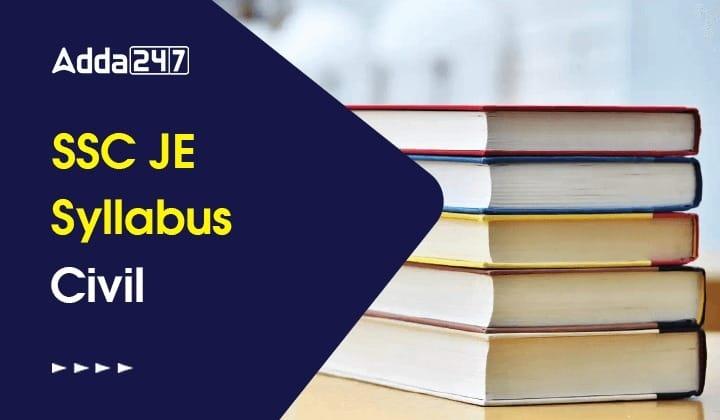
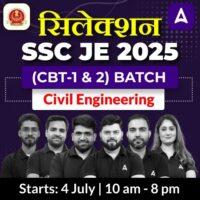

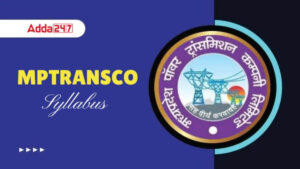 MPPTCL Syllabus 2025 & Exam Pattern,...
MPPTCL Syllabus 2025 & Exam Pattern,...
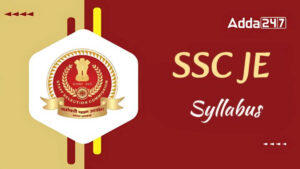 SSC JE Syllabus 2025 for Tier 1 and Tier...
SSC JE Syllabus 2025 for Tier 1 and Tier...
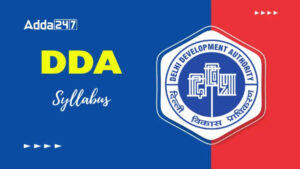 DDA JE Syllabus 2025 and Exam Pattern, D...
DDA JE Syllabus 2025 and Exam Pattern, D...
